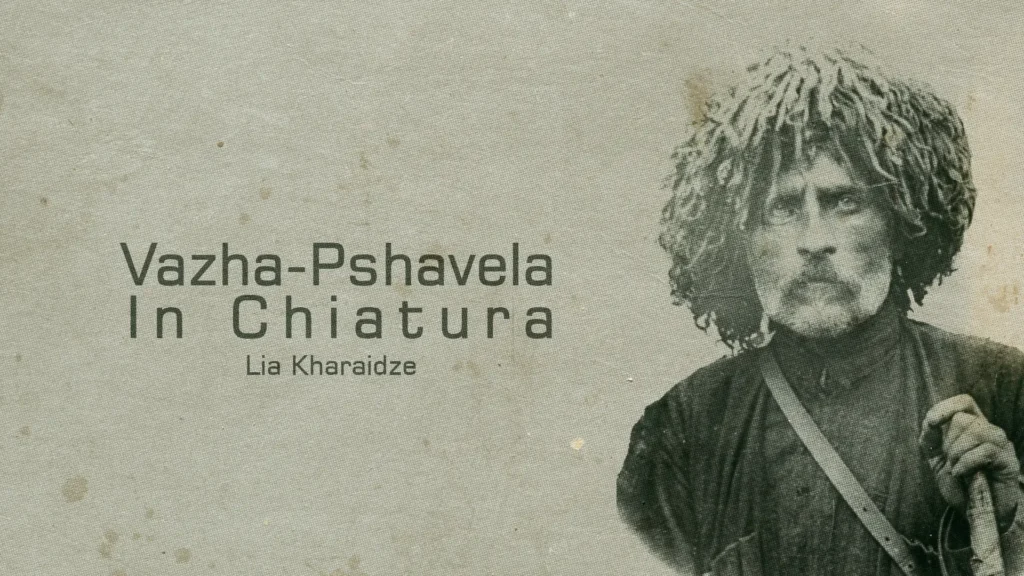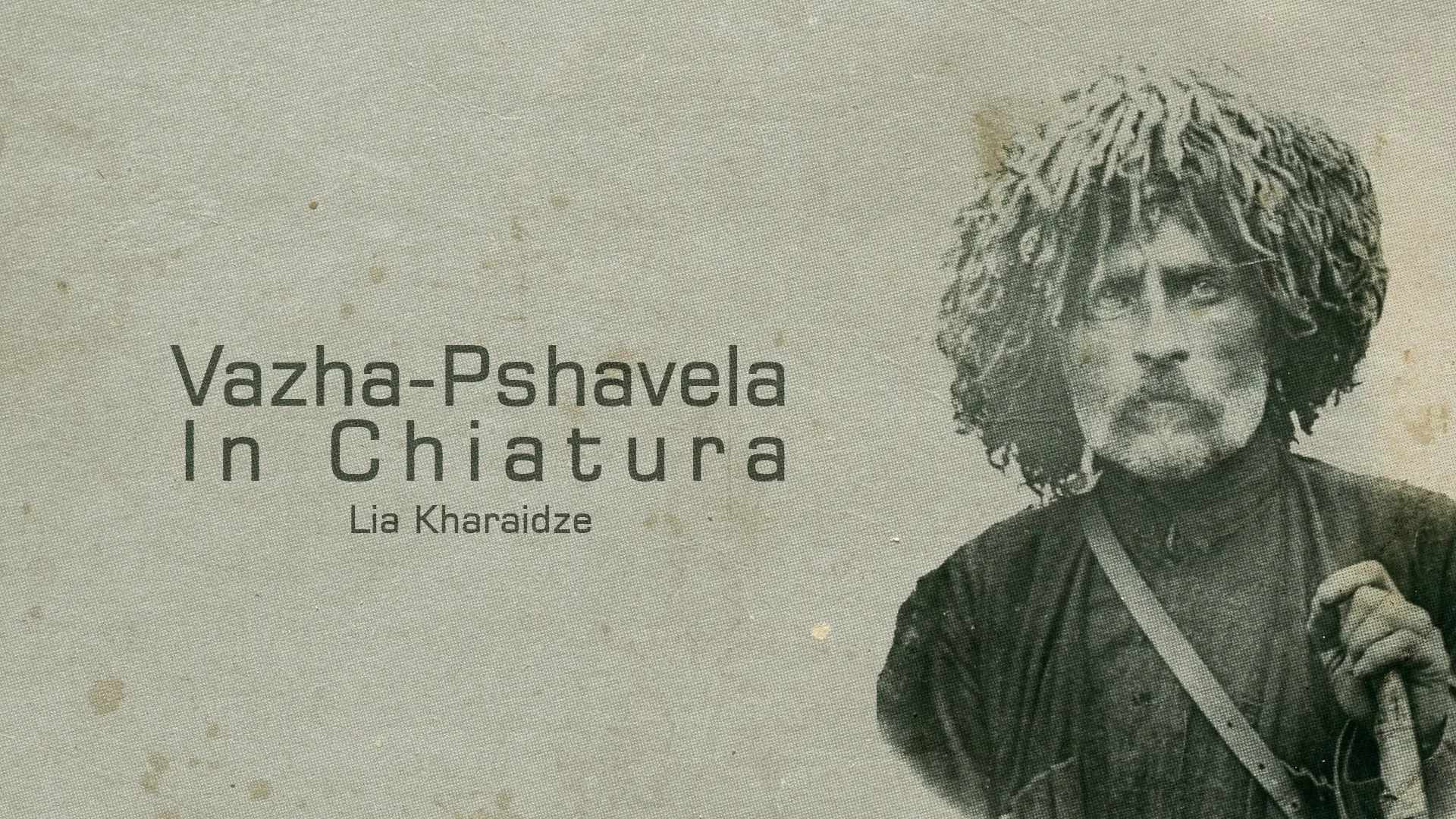
Author: Lia Kharaidze
The last century left us with many interesting traditions, but one of the finest must be the gatherings of writers with their readers and the presentation of their creations. Old periodicals and the memoirs of contemporaries have preserved fascinating details of the great Georgian writer Vazha Pshavela’s trip to Western Georgia in 1913.
Much has been and will be written about Vazha’s brilliant creativity, but I would like to draw your attention to intriguing episodes retained in these memoirs.
In 1913, the intelligentsia of Kutaisi decided to introduce Vazha Pshavela to the public. He had previously been invited to Kutaisi, first in 1910 for an evening dedicated to Ilia Chavchavadze, and again in 1913. This visit was more extensive.
“The evening of February 20th took place in the city theater… The curtain rose and for the first time, the writers of Kutaisi appeared on stage, reading their works, followed by singer Akopashvili. Everyone froze in anticipation at the sight of the stage, waiting for the mountain poet to appear; as soon as Vazha Pshavela emerged, typically dressed in the traditional Chokha-Akhalukhi (Georgian traditional clothing), endless applause broke out. When the crowd settled, the poet read some of his works. His poems were delivered with such graceful declamation and emotion that they greatly impressed the audience. The poet was called back four or five times and read different poems. In the end, he recited a new poem written on the spot, ‘To Imereti’:
‘Once you were angry with me,
My mother, beyond the Likhi Ridge,
Now, I see you’ve reconciled with me,
Here I dare to greet you.
In you, I see Kartli and Kakheti united,
You are the shield and sword of Georgia,
Let others take an example from you.
What I like about you is that your doors
Are firmly closed to strangers…
Let the hangman take him,
Who dares to harm you!’” (literal translation)
After the evening ended, the audience continued to applaud for a long time and did not disperse until Vazha appeared on stage in Burka and Kabalakhi. (“Sakhalkho Gazeti”, 1913)
“That evening we set a small table for Vazha… I remember around the table sat Iya Ekaladze, Razhden Gvetadze, Theophile Khuskivadze, and others. The toastmaster Theophile Khuskivadze addressed Vazha with a beautiful speech. Vazha listened and replied: ‘Excuse me, but you Imeretians do tend to exaggerate: if a person wants to drink, he should quench his thirst, what’s there to thank him for? I am no more, no less: I feel the thirst and I quench it, why thank me? I want to sing [my poems], so I sing!’
In 1913, the Chiatura Drama Society decided to organize an evening to strengthen its assets. It was decided to invite Vazha Pshavela. The task was entrusted to the teacher Iv. Gomelauri who notified Vazha:
‘Dear and esteemed Vazha! As you know, I have been chosen to deliver this message. Here’s the matter: The Chiatura Drama Society plans to hold an evening ball on the 18th of this month to strengthen its assets. You are asked to take this opportunity to present yourself and your creativity to our community. But it is inconvenient to bother you from such a distance, especially since they cannot offer more than five tumans ( currency equal to ten maneti ) for the journey… Nevertheless, they dare to ask you through me to make an effort and come to Chiatura by the 18th… Personally, I beg you: do not refuse us. You must let us know your answer as soon as possible, preferably by telegram. You will be provided a ticket from Tbilisi directly to Chiatura. At Shorapani station you will transfer to a narrow-gauge railway to Chiatura. We will meet you at the station. I hope you will not deny us. Sincerely, teacher Iv. Gomelauri. May 7, station Chiatura. My address: Daba Chiatura, Iv. Gomelauri.
Batono Vazha, here you will see much that cannot be found in any other corner of Georgia. By the way, that’s one of the reasons I wish you to come. Venture forth! Yours, Vano Gomelauri” (letter preserved in the Manuscript Department of the Museum of Georgia). Vazha sent Gomelauri a letter of consent.
“On the appointed day the theater could not accommodate all who wished to attend. Vazha was expected by the morning train – recalled later by event participants Shakro Vashadze and David Tatishvili. A group from the community met each train along with the hosts, but in vain. Vazha was nowhere to be seen. An unfortunate incident had occurred with the poet before he transferred to the Chiatura narrow-gauge train. Vazha arrived very early, and no one met him at that hour. He started walking around the platform. When a gendarme saw a man wandering in shabby clothes, he arrested him as a suspicious person. The great writer spent several hours in a cell with thieves. The poet was released from forced detention with the support of Irakli Dekanozishvili and his wife Victoria. And then ‘the last hope’ – the last train at 9 pm arrived, and in the window appeared the figure of Vazha, which caused tremendous joy. His inviters, I. Gomelauri and S. Taruashvili helped him off the train amidst applause from the audience. In honor of Vazha, a grand meeting was held, and live flowers were presented. The evening consisted of four acts. The first part began with an introduction and presentation of Vazha and ended with several songs by a choir, conducted by Mr. Al. Kavsadze. In the second section, ‘Prison Secrets’ were presented, in the third section Vazha elegantly read several of his poems. Each poem he read was met with unanimous applause from the audience. In the evening, the poet read the poems: ‘To the Dagger’, ‘Pour and Serve’, and a third poem, which could not be identified. Then, the people of Chiatura arranged a dinner for the dear guest. (,,Sakh. Gaz” 1913 N19)
I. Gomelauri showed Vazha around Chiatura, they visited the school where he taught, and he attended an art exhibition, which the poet greatly enjoyed. He also had a meeting with the Society for the Promotion of Literacy in Chiatura, which had published ‘Three Youthful Tales’ by Vazha along with the author’s biography in 1911. Remarkably, the attire of this distinguished writer presented a serious problem. He was caught in Chiatura, and funds were sent from Kutaisi for him to dress appropriately – “a question was raised – how should the committee behave, given that Vazha does not have a presentable Chokha-Akhaluki and how can we present him to the public in such an old, torn garment. It was decided to send Vazha a hundred rubles for the purchase of a new chokha-akhaluki and new shoes before his arrival. ‘The gendarme in Chiatura considered him a vagrant and arrested him. In the same year 1913, Vazha was also invited to Poti. Here’s what the journal ‘Gantiadi’ writes: ‘Then the door opened, and on the stage appeared a plain man with short hair who bowed to the audience. The applause was heard here and there. Everyone asked, who is he… I think this is Vazha Pshavela. – It can’t be, that’s not Vazha Pshavela, his attire should be completely different, cuffs and a tie, and so on. Eventually, many recognized him, and realized that it was Vazha, but still could not imagine such simplicity in the famous poet’ (from the memoirs of S. Tabliashvili – journal ‘Gantiadi’). By this time, Vazha had already written his brilliant works: ‘Aluda Ketelauri’ (1888), ‘Bakhtrioni’ (1892), ‘Snake Eater’ (1901), ‘Gogotur and Apshila’ (1887), ‘Guest and Host’ (1893), and other great poems and stories.
Such was the great creator!!!
